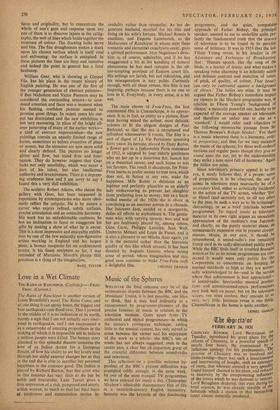MUSIC of the Spheres WHATEVER the final outcome may be
of the acrimonious dispute between the BBC and the Musicians Union, it is just possible, one likes to think, that it may lead indirectly to a reassessment by programme-planners of the precise function of music in relation to the television medium. Quite apart from TV orchestral and recital programmes—in which the Camera's roving-eye technique, adding little to the musical content, has only served.to come between• the viewer and his enjoyment of the work as a whole—the BBC's use of music has not always suggested, even in the recent past, a clear but all-important grasp of the essential difference between sound-radio and television.
This reflection on a possible welcome by- product of the BBC's present difficulties was prompted oddly enough. in the same week, by one of the most tranquil TV programmes we have enjoyed for many a day. Christopher Mayhew's admirable documentary film of life in a twentieth-century English monastery. Serenity was the keynote of this fascinating
programme, and the quiet, compulsive approach of Father Bishop, the principal speaker, seemed to me to underline quite per- fectly the fundamental truth that the ponce of television is to be found in its peculiar sense of intimacy. It was in 1933 that the late Filson Young wrote, in his Studies in the Adventure and Technique of Broadcasting, that: 'Human speech, like the song of the birds, is a matter of music, and what makes a speaking voice charming is an infinitely subtle and delicate contrast and mutation of tones, of pitch, of quality, of colour, That beautY can only he cultivated against a background of silence.' The italics are mine. It may be argued that Father Bishop's immediate impact on viewers in the Mayhew programme was, in relation to Filson Young's 'background of silence,' a naturally powerful one, hardly to be expected of the average speaker on television, and therefore an unfair one to cite as a 'standard.' I would refer such objectors to the following memorable passage from Sir Thomas Browne's Religio Medici: 'For there is a music wherever there is a harmony, order or proportion:• and thus far we may maintain the music of the spheres; for these well-ordered motions and regular paces though they give 110 sound unto the ear, yet to the understanding they strike a note most full of harmony.' Again the italics are mine.
Since television's primary appeal is to the eye, it surely follows that, if a proper sense of proportion is to be observed, the use of Music in television must necessarily be of,5 secondary kind, either as artistically incidents! to the action of the TV screen, whether 'five' or filmed (and certainly not, as all too often in the past, in such a way as to be irritatingly distracting), or as a brief interlude between programmes. To regard music as television material in its own right argues an unrealistic appreciation of the medium's true function, and clearly, on the purely material plane, an unnecessarily expensive one in present circunr stances. Music, in any case, it should be remembered, is sound-radio's one remaining trump card in its sadly-diminished public pack.
the BBC finds itself in troubled financial waters as far as its music programmes arc cow milted it would seem only politic for the Corporation to concentrate on keeping its musical standards as high as they are univer sally acknowledged to be—and in the service
where that achievement is best appreciated-- in sound-radio. Spectacular musical prodtic' tions and commissioned-opera performances may look well on paper, but on the television screen, one must confess, they amount to so very, very little. Intimate revue is one thing, CinemaScope in the home is quite another.
LIONEL GAMLIN


































 Previous page
Previous page